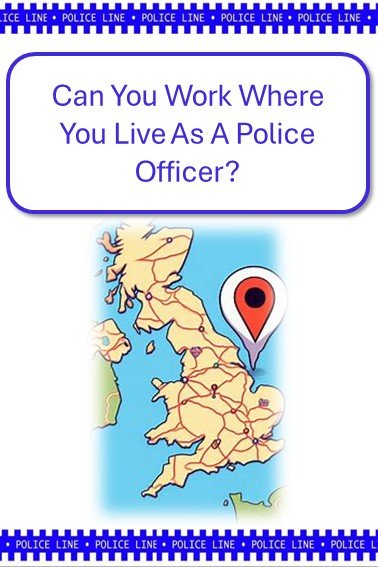Whether a police officer can work in the area where they live is a common question for those joining or considering joining the force. There are pros and cons to working in your local area that officers must weigh up. This article explores the policies and factors to consider regarding police officers working where they reside in the UK.
Overview of policies on working locally
There is no outright ban on police officers working in the area where they live in the UK. However, most police forces do have guidance on officers working in their home neighborhoods.
So while not prohibited, local police forces prefer to avoid officers working on their home turf where possible.
Some of the reasons behind this guidance include:
- Avoiding any accusations of bias or conflicts of interest
- Separating professional and personal lives
- Preventing officers from becoming too familiar with locals which could hinder their authority
- Safeguarding the officer, their family, and property
However, in more rural areas or smaller forces, it may be unavoidable for officers not to work in the vicinity where they live.

So it often comes down to the discretion of senior officers when deciding on placements.
Potential benefits of working locally
While working where you live is generally discouraged, there can be some potential benefits for officers in some circumstances:
- Local knowledge – Officers with extensive local knowledge of the area, residents and crime trends can use this to their advantage.
- Community links – Being part of the local community can help foster positive relationships and trust with residents.
- Work-life balance – A shorter commute to work can allow more time for family responsibilities.
So in the right circumstances, such as more rural areas with smaller populations, officers working locally can potentially boost community policing.
Drawbacks and risks of working where you live
However, there are also considerable drawbacks and risks to officers working in their home neighborhoods that forces consider:
- Accusations of bias – Officers may face allegations of preferential treatment of certain people or places.
- Compromised safety – Criminals targeting an officer and their family/property is a major risk.
- Conflicts of interest – Personal relationships and vested interests could cloud professional judgement.
- No escape from work – Officers need a distinction between work and personal life for their mental health.
- Abuse of position – Temptations to misuse powers such as unauthorized checks on people.
- Familiarity issues – Locals see an officer off-duty as just a neighbor rather than an authority figure.
Many officers feel working where they live could jeopardize their privacy, safety, and professional standing within the community.
Factors police consider when working locally
When deciding on whether officers should work in their residential area, some of the key factors police forces consider include:
- Size of area – In large cities, it is easier to avoid the local neighborhood than in small towns.
- Specialism – Those in sensitive roles like undercover work may particularly wish to keep their distance.
- Relationships – Whether the officer has personal associations that could cause conflicts of interest.
- Family – Risks to family must be evaluated, especially for those with children.
- Commuting – Travel time to and from the station needs factoring in.
- Rank – Higher ranked officers are more likely to be recognized and targeted off-duty.
- Crime levels – Higher crime areas pose greater threats to officer safety at home.
- Community relations – A locally embedded officer can help improve police-community links.
By weighing up these kinds of factors against the skills and wishes of the officer, their management can make informed decisions on suitable placements.
What are an officer’s options?
If an officer has strong objections to working in the immediate vicinity of their home, what options do they have?
- Request placement in a different sector of the force area. Most forces are divided into multiple sectors, divisions, or neighborhoods.
- Ask for a move to a role in a different department, like CID, that reduces local patrols.
- In serious cases such as threats, seek authorization for enhanced security at their home address.
- Relocate their personal address to maintain distance from their duty station. Although costly, some officers rent a separate property just for work days to keep their home life more private and safe.
- As a last resort, apply for a transfer to a force in another region if conflicts of interest are untenable. Forces can be understanding of such requests in exceptional cases.
So while not an absolute right, officers can lobby their supervisors to avoid working on home turf. But in many situations, police must be prepared to work within the area they serve, including the streets where they live.
Key takeaways
- There is no outright ban on police working in their local area, but most forces discourage it where possible.
- Potential benefits like local knowledge must be weighed against risks like compromised safety and conflicts of interest.
- Considerations like an officer’s specialism, family, and relationships help managers decide on suitable placements.
- While not guaranteed, officers can request to avoid working near home in serious cases by moving sectors, departments or even forces.
- With reasoned discussion between officers and managers, acceptable compromises and placements can normally be agreed.
So in summary, whether police can work where they live in the UK comes down to each force judging the needs of the job against the circumstances of their officers. With open communication and flexibility on both sides, satisfactory solutions are usually found to balance operational requirements and officers’ reasonable wishes.
